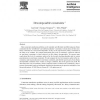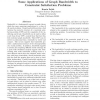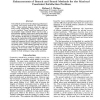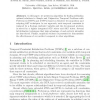36 search results - page 2 / 8 » Using Inferred Disjunctive Constraints To Decompose Constrai... |
COMPULOG
1999
Springer
13 years 9 months ago
1999
Springer
Many constraint satisfaction problems can be naturally and efficiently modelled using non-binary constraints like the “all-different” and “global cardinality” constraints...
AAAI
1990
13 years 5 months ago
1990
Bandwidth is a fundamental concept in graph theory which has some surprising applications to a class of AI search problems. Graph bandwidth provides a link between the syntactic s...
AAAI
1996
13 years 6 months ago
1996
Two methods are described for enhancing performance of branch and bound methods for overconstrained CSPS. These methods improve either the upper or lower bound, respectively, duri...
CP
2005
Springer
13 years 10 months ago
2005
Springer
In this paper, we present an algorithm for finding utilitarian optimal solutions to Simple and Disjunctive Temporal Problems with Preferences (STPPs and DTPPs) based on Benders’...
CSL
2008
Springer
13 years 6 months ago
2008
Springer
Abstract. A positive temporal template (or a positive temporal constraint language) is a relational structure whose relations can be defined over countable dense linear order witho...




